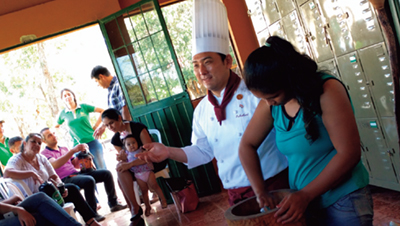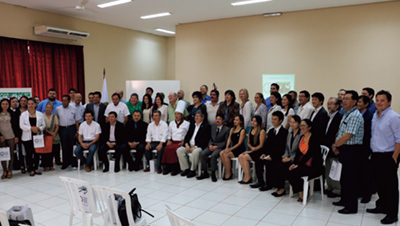Master Techniques from Japan to the World 6
Reviving the Sesame Industry in Paraguay!
– Towards Improvement of Production Management Technology and the Development of New Markets
Agriculture and livestock industry is the core industry in Paraguay, with approximately 250,000 small-scale farmers operating in the country. This number accounts for approximately 83% of all the farmers, and the majority live in the eastern part of the country where the poverty level is high.
Until the mid-1990s, cotton was the main product for these small-scale farmers. However, with a decline of cotton prices the international market, sesame became the main crop since around 2005. Sesame was chosen particularly because its cultivation requires fine manual work and it is appropriate for small-scale farmers.
The sesame industry in Paraguay is in fact deeply related to Japan. Originally, the industry was begun in 1989 by a Japanese immigrant, Mr. Toshikazu Shirosawa. The majority of the sesame produced was shipped to Japan, and during a certain period, Paraguay was the largest exporter to Japan, supporting Japan's demand for sesame for food use. However, export of sesame has been dropping as a result of the decrease in its production due to the negative effects of mono-cropping and the reinforcement of Japan's residual agrichemical standards. Besides, the number of competing regions with low production costs, such as Africa, has increased and the price of sesame has dropped as a result, which made sesame production less attractive for many small-scale farmers.

Mr. Fukahori and the participants in a seminar of pounding sesame, held in San Pedro (Photo: Wadaman Science Co., Ltd.)
In these circumstances, a Japanese manufacturer of sesame products Wadaman Science Co., Ltd., headquartered in Kyoto, started a two-year project “Verification Survey with the Private Sector for Disseminating Japanese Technologies for Management of the Production of Processed Sesame Products to Add Value to Products of Small-Scale Farmers” in 2016 with the cooperation of JICA in order to revive the sesame industry in Paraguay and help small-scale farmers to develop better living environment.
The project activities were developed based on three themes.
The first theme is to transfer sesame processing technology and make the sesame products more high value-added through processing. Wadaman Science first attempted to transfer its sesame processing technology to the Paraguayan people involved in sesame industry, such as companies and sesame farmers. The ability to produce processed sesame products there would increase domestic consumption and open up the possibility to export high value-added processed products in the future, in addition to the current exports of raw sesame.
The second theme is to create a Paraguayan domestic market by developing sesame products which meet local needs. The sesame market in Paraguay might disappear if the international price of sesame became more competitive, which would lead to a decrease in Paraguay's export. To avoid this situation, Wadaman Science aimed to develop a domestic market and expand that market to neighboring countries as a future target.
To achieve this aim, Wadaman Science carried out a project which covers from market research to product development in cooperation with the National University of Asuncion as the local partner, resulting in seven prototype products. They conducted a market survey to test consumer reaction, the results of which were extremely positive. For example, “sesame sugar,” which is mixture of sesame and sugar, became extremely popular with local people. Besides, technical seminars were also held for sesame related companies for the purposes of providing them with technical support to carry out their own product development.
The third theme is to disseminate a culture of consuming sesame. In fact, very few Paraguayan consider sesame a food, in spite of its popularity as an export product. Therefore, Wadaman Science repeatedly held seminars for sesame farmers to introduce how to use it and demonstrated grinding sesame using mortar in order to let the Paraguayan people know that sesame is a delicious and healthy food.

Participants' group photo at the final report meeting, held in Asunción(Photo: Wadaman Science Co., Ltd.)
Mr. Katsunori Fukahori, CEO of Wadaman Science, explains how the Paraguayan farmers viewed the company's activities and changes they brought about.
“The Paraguayan people have great trust in the Japanese people, thanks to the presence of the Japanese immigrants and JICA. At the early stage of our project, unfortunately we did not find strong interest in learning the technologies for sesame products. However, they gradually became aware of our sincere desire to make the world better using sesame, and as a result we became able to exchange ideas more openly. In particular, women attracted by the appealing point that sesame is useful as beauty supplement participated proactively in our activities.”
These changes among participants also brought about a change in the awareness among officials of the Departamento de Extensión Agricola (Agricultural Extension Department) of the Paraguay Ministry of Agriculture and Livestock and members of Paraguayan farmer's associations who assisted with the seminars. It has also been reported that farmers who participated in the seminars have begun using sesame as an edible material at home, and local restaurants have started selling products using sesame.
In the near future, Wadaman Science plans to import sesame oil processed in Paraguay to mix it with salad oil and to sell mixed sesame oil in Japan for making delicious fried foods, showing progress in the development of new high value-added products using sesame. The export of processed sesame products through this project is a new step for Paraguay's sesame industry that had previously only exported raw sesame.
<< Previous Page
Main Text | Statistics and Reference Materials | Stories from the Field | Master Techniques from Japan to the World | ODA Topics
